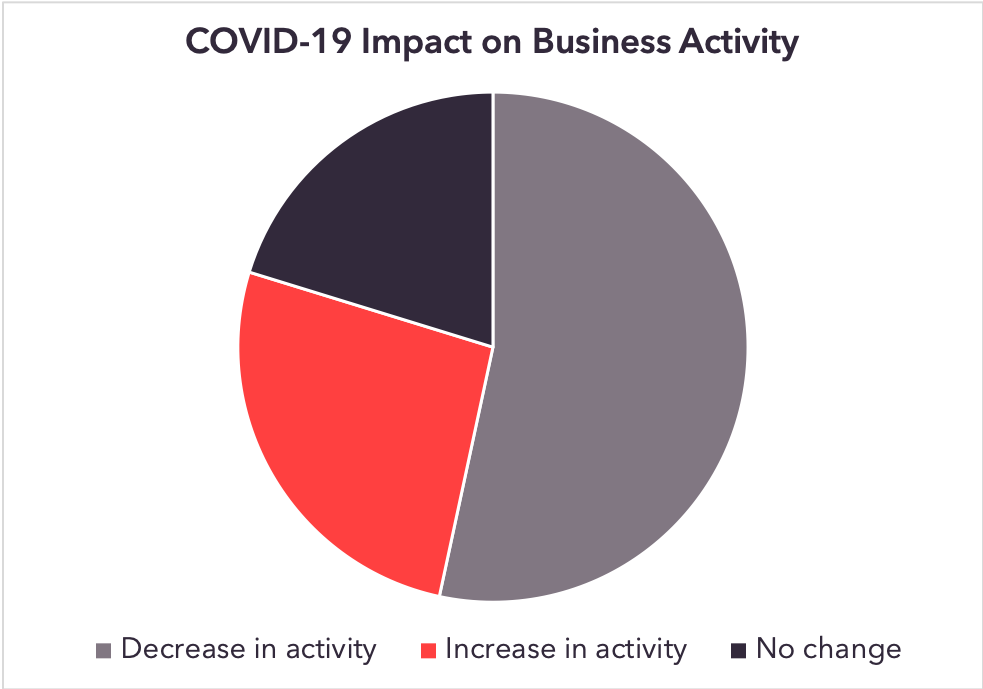

Healthcare & the Economy Webinar
Published: 04/01/2020
Updated: 06/11/2021
Regional Report: A GPEC Virtual Series
It’s been said that when times get tough, you find out what you’re made of. We’re living through an unprecedented period as a result of the COVID-19 pandemic, and the impact the virus is having on our communities, healthcare infrastructure and economy is severe.
We don’t yet have all the data to understand the true economic impact, and without data, there is no consensus about when the global economy will recover, and return to the growth trajectory before the outbreak.
GPEC did uncover through a recent flash poll that 53 percent of respondents noted a decrease in business activity as a result of COVID-19. 26 percent cited an increase in activity and 20 percent said they haven’t experienced any change.
GPEC was established to convene the community in preparation for challenging moments like this, and we understand what our organization and region are made of. There is an undeniable spirit about Greater Phoenix — one rooted in strength, collaboration and resilience.
On Monday, during the launch of ‘Regional Report: A GPEC Virtual Series,’ we discussed how the regional economy and healthcare sector have been impacted by COVID-19.
The debut webinar, which was attended by more than 520 participants, provided valuable and timely information impacting both business and people in Greater Phoenix.
Aiming to provide listeners with latest about COVID-19 on both fronts, the panel of experts included:
-
- GPEC President & CEO, Chris Camacho
- Banner Health President & CEO, Peter Fine
- Rounds Consulting Group President, Jim Rounds
- and the discussion was moderated by Eric Sperling, managing director of Social Television Network
At the forefront of the issue, and unequivocally GPEC’s top priority, is the health and safety of our employees, stakeholders and community. That isn’t possible without the efforts of the healthcare professionals and frontline personnel working fearlessly around the clock, and putting themselves in harm’s way to serve residents during this time.
“I want to recognize those frontline workers that are doing so much work on behalf of our community,” said Camacho in his opening remarks.
Healthcare
Peter Fine didn’t mince words when it came to the severity of the outbreak and where the U.S. compares to other countries around the world.
“We are dealing with something none of us have had to deal with – certainly not in my career,” he said. “We have had a slow response to what is going on in the country and it’s more aligned with Italy as opposed to Taiwan and Singapore, which jumped on this very early. Their results are much better, and their problem is not nearly as significant as our problem.”
Fine pointed to five key differences between countries having success containing COVID-19 and the U.S., which now leads the world in confirmed cases.
• Testing early and often
• The production of products that need to be manufactured to allow testing to happen
• Tracing
• Isolation
• And practicing extreme levels of social distancing
While there is no treatment or cure, Fine did share a real-time update with the audience related to a vaccine.
“We did hear today that J&J believes it has a vaccine that they’re going to start trialing in September, and if all goes well, we could have a vaccine in the first quarter of next year. They are preparing to create a billion doses of that vaccine,” said Fine. “That’s the first hope that we have seen of something real that will happen quickly, getting rid of all the regulation associated with getting a vaccine into market, which could take 18-months typically.”
Until that time, Arizona is playing catch-up, despite the efforts from the state to combat the spread of COVID-19.
“We’ve got the lowest number of tests per capita than any place in the US,” said Fine. “That is very upsetting, very disconcerting, and in fact, prevents us from identifying and isolating quickly enough.”
While Banner has established four collection drive-thrus, three in Phoenix and one in Tucson, they are running low on testing kits and are unsure whether or not they will have to shut those down.
In response, Banner Health has set up an online ‘Symptom Checker’ and boosted its virtual capabilities to help identify those most at risk to try and mitigate the number of patients checking themselves into the E.R. and Urgent Cares’ with moderate symptoms.
“80 percent of these patients are going to have mild symptoms and can be managed at home taking proper care,” said Fine. “They don’t have to be running into a facility. It’s only when you have certain symptoms that advance in a way that requires that next level of care.”
Social Distancing
Fine made it clear that in order for Greater Phoenix to cull the spread of COVID-19, social distancing is the solution, but also a real issue currently in terms of adoption.
“Number one, don’t congregate with groups. It’s too risky. If you have to go to the grocery store or drug store, go do it, otherwise, don’t be hanging around with groups. This is a serious, serious virus, and people need to take it in a serious way. It’s one we have never seen before and that’s why it’s so hard to deal with it,” said Fine. “Wash your hands and do it frequently, multiple times a day. If you get a cough, cough into a Kleenex and get rid of that Kleenex, don’t cough into the air. And stay home. If you’re ill and you don’t feel good in the slightest way, stay home and stay away from the public environment.”
The healthcare community is getting assistance on Monday with Gov. Ducey issuing a stay-at-home order, which began at 5 p.m. MST on March 31, and goes through at least April 30.
Economy
While organizations like Banner Health work with city and state officials to deal with the healthcare implications and needs, there is also an economic reality. GPEC understands the gravity of this situation, and quick and decisive action is necessary to prevent a prolonged pandemic that will have drastic personal, societal and economic impact.
Leadership at the city and state level has prepared our region to face these times with resilience in mind. Gov. Ducey’s thoughtful positioning ensures we have a strong rainy-day fund should this economic picture decline further, and City of Phoenix Mayor Gallego took pivotal action to push for a state of emergency to bring more resources and attention to what is needed here in the 5th largest city in the U.S.
Announced on Monday, Partnership for Economic Innovation and Pipeline AZ, with the support of GPEC and many local and statewide community partners, launched “Now Hiring #C19AZ,” to help alleviate the impact of COVID-19 on people and businesses by connecting out-of-work Arizonans to immediate openings.
This unprecedented approach to help redirect crisis job seekers at scale — leverages Pipeline AZ’s skills-matching technology, and virtual hiring fair capabilities, to pair incoming job seekers to real-time openings, and coach them through the transition. Job seekers and employers can visit C19AZ.com to register.
“This community comes together in trying times and finds ways to help one another. I just left a call that Jim [Rounds] and I were on with other community leaders talking about giving a hand up to your neighbor. That’s what it takes during these challenging times to get through what we’re experiencing,” said Camacho.
But the work continues, and GPEC and our partners are steadfast to the task at hand.
“The team is committed to working around the clock to meet the needs of the community,” said Camacho. “GPEC is aggressively interacting with the companies in our pipeline, of which, there are still 300 companies evaluating this market. 90 percent of those companies, while taking a pause, are still actively considering investment decisions into this year.”
Economic Outlook
Jim Rounds, president of Rounds Consulting Group, is optimistic about the region’s prospects coming out of this pandemic and coinciding economic downturn.
“I really believe that we are going to come out of this in a positive way once we get through a few more months of pain,” said Rounds. “I think we are going to see additional activities come back to the U.S. and I think Arizona is going to be a great place for that.”
While there are challenges ahead and consequences in the form of national debt, imbalanced budgets, GDP decline and job losses, Rounds discussed his economic outlook for Greater Phoenix in a fairly positive light and issued a challenge to organizations like GPEC tasked with finding solutions to the challenges.
“On the front end, we’re trying to figure out how to get a lot these businesses through this tough time,” said Rounds. “People have been brainstorming, but it has to start rolling up into some hard ideas. We actually need to convert the brainstorming into specific policy changes.”
After we get through this economic downturn, Greater Phoenix must accelerate and organizations like GPEC are putting in place strategies to assure Greater Phoenix is positioned for recovery.
“We’re going to have a decent expansion after this, but things are going to be different and it’s going to be challenging to get through this,” said Rounds. “I love the idea of having some kind of promotion about how we let people know that you need to look out for your neighbors.
GPEC is focused on short-term strategies to support the businesses and families in Greater Phoenix, but we’re also looking at how we accelerate the rate at which we can get back to doing business. Opportunity does exist during, and coming out of every crisis, and we’re going to ensure we’re well positioned for when the sun shines bright again.
“Nothing should be off the table,” said Camacho. “How do we become more competitive for manufacturing and base industry? How do we reform our tax code, so we are the most competitive market in the Western U.S. for advance distributing?”
It will be important to continue building our innovation capacity to efficiently and effectively respond to unprecedented events with unique solutions that allow us to develop and deploy resources to places with the highest needs.
What this pandemic does not have the power to do is take away the spirit of Greater Phoenix. We need to remember that this region is a place that is incredibly attractive to businesses looking for expansion opportunities. The team at GPEC is working incredibly hard on business attraction efforts and have maintained a strong pipeline of businesses still dedicated to growth. Maricopa is the fastest growing county in the United States and there’s good reason for that.
One of the things that makes Greater Phoenix such a special place to live and work is our diversity and inclusiveness. Unfortunately, tough times bring out the worst in people, but we’re built on coming together, and not exclusion.
“There is no room for bigotry or hate in the equation, and I want to ensure that Arizona stays on the edge as it relates to diversity and inclusion, and welcoming all types of people,” said Camacho.
We know you’ve seen the stories of strife as a result of COVID-19, but we invite you to see the local stories of people helping people, of businesses developing creative revenue streams and of ways we stay virtually connected as a community. Even in times of uncertainty, Greater Phoenix becomes Greater Together.
Use #GreaterPHXtogether on social media to share the positive stories about how our community is coming together.
